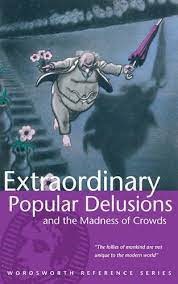‘Are you delusional?’: The title of Victoria Shepherd’s recent magazine article
 The Autumn 2022 issue of the New Humanist contains this article, written to coincide with the publication of her latest book: ‘’A History of Delusions; the Glass King, a Substitute Husband and a Walking Corpse’’ (Blackstone Publishing). If that doesn’t make you want to rush out and buy it, penned by this historian, radio documentary and podcast producer, then reading is probably not for you.
The Autumn 2022 issue of the New Humanist contains this article, written to coincide with the publication of her latest book: ‘’A History of Delusions; the Glass King, a Substitute Husband and a Walking Corpse’’ (Blackstone Publishing). If that doesn’t make you want to rush out and buy it, penned by this historian, radio documentary and podcast producer, then reading is probably not for you.
 As an avid studier of financial markets, one of my favourite books is Charles Mackay’s ‘Extraordinary Popular Delusions and the Madness of Crowds’ (1841). My John Wiley & Sons copy was printed (1996) together with ‘Confusión de Confusiones’ by Joseph de la Vega (1688). I can thoroughly recommend. These texts back up Victoria’s idea that the ’the principal types of delusions have remained consistent for as long as there have been records.’ She continues: ‘I’ve come to see delusions as imaginative creations, their meanings encrypted’.
As an avid studier of financial markets, one of my favourite books is Charles Mackay’s ‘Extraordinary Popular Delusions and the Madness of Crowds’ (1841). My John Wiley & Sons copy was printed (1996) together with ‘Confusión de Confusiones’ by Joseph de la Vega (1688). I can thoroughly recommend. These texts back up Victoria’s idea that the ’the principal types of delusions have remained consistent for as long as there have been records.’ She continues: ‘I’ve come to see delusions as imaginative creations, their meanings encrypted’.
Which neatly segues on to why I’m writing about this today. As many will be aware, crypto currencies and big technology companies have taken a beating this year. The latest, and one of the biggest, was Friday’s bankruptcy proceedings for the US crypto currency exchange FTX, which at peak was estimated to be valued at $32 billion. The famous US FAANGS have so far all lost between 30% and 80% from peak value – which wasn’t all that long ago.
In the same magazine Rami Gabriel, associate professor of psychology at Columbia College Chicago, notes how our ancestors lived by a strict and unchanging set of beliefs, while many of us feel that science has liberated us from this straight jacket. This then leads us to a reliance on psychology and disdain for previous mantras. In this way the seeds for the next rise and fall, boom and bust, are sown. Artificial Intelligence here we come!
Let’s not forget that this year many Central Banks jumped on the CBDC bandwagon: Central Bank Digital Currency. And late in October the British Parliament was pushing to make crypto regulated financial instruments. As if they hadn’t got their hands full enough with Fiat money!
Tags: Psychology, unexpected
The views and opinions expressed on the STA’s blog do not necessarily represent those of the Society of Technical Analysts (the “STA”), or of any officer, director or member of the STA. The STA makes no representations as to the accuracy, completeness, or reliability of any information on the blog or found by following any link on blog, and none of the STA, STA Administrative Services or any current or past executive board members are liable for any errors, omissions, or delays in this information or any losses, injuries, or damages arising from its display or use. None of the information on the STA’s blog constitutes investment advice.
Latest Posts
- Navigating the Market: Insights from Robin Griffiths and Ron William April 9, 2025
- Avoid Revenge Trading: The Key to Long-Term Trading Success March 31, 2025
- Mastering Relative Strength Portfolios: Key Takeaways from the March STA Meeting March 12, 2025
- Stay Disciplined, Stay Profitable February 26, 2025
- Understanding Price Gaps in Trending February 19, 2025




















Latest Comments